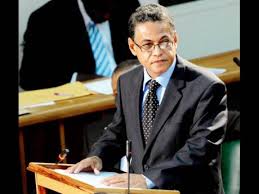
NATIONAL BUILDING BILL AT ADVANCED STAGE OF DEVELOPMENT…TO BE TABLED SOON IN PARLIAMENT
Minister of Local Government and Community Development, Hon. Noel Arscott, says the National Building Bill now being developed will have a profound impact on the way commercial and residential construction is conducted in Jamaica.
Speaking recently at the launch of Engineers’ Week 2015 in Kingston, Mr. Arscott said Jamaica has had historical problems with insufficiently planned development, illegal occupation of, and illegal construction on private and public land and legislation that has lost its relevance to modern realities. He said the National Building Bill has three broad aims, which are to create a new legal and regulatory framework, reduce the vulnerability of the built environment and ensure public safety, and minimize damage caused by natural or man-made hazards, prevent squatter settlements and promote sustainable development.
“The Bill will regulate building work by requiring permits, regulate change of building use, give effect to the National Building Code, facilitate the adoption and application of internationally recognized building standards, as well as the accreditation of building products, construction methods, building components and building systems. These emphases on modernity and effectiveness also include the construction of buildings that are environmentally friendly and energy-efficient, and, also, accommodate the public good through features such as sanitary facilities and access points for persons with physical challenges.
It will also create the framework for an efficient system for issuing building permits and certificates of occupancy, establish a fair system for the resolution of building disputes, regulate training and certification standards, license building practitioners and establish procedures for recognizing building professionals.”
The Minister also disclosed that the Kingston and St. Andrew Corporation and all Parish Councils and Municipalities, will constitute Local Building Authorities, who will provide overall administration of the Bill in their respective jurisdictions. They will consider applications for building permission, ensure that all building work within their areas of jurisdiction is carried out in accordance with the Bill and the National Building Code; issue certificates of compliance and certificates of occupancy for buildings and building work, and prescribe fees for services provided by them or on their behalf. Mr. Arscott also said the Bureau of Standards will function as a national Standards Authority, with the responsibility for administering the National Building Code.
The Code applies to every builder, every owner or occupier of land where building work has been carried out or is to be carried out, any person who carries out, or tries to carry out building work, and any other person involved in managing work on any parcel of land. It also covers every building practitioner or building professional who prepares plans and specifications for building work.
In noting that there have been instances where developments have caused conflict with the residents in the areas they are being implemented, the Minister said the Bill will provide a mechanism to ensure that the rights of individual property-owners and communities are respected. This will take the form of a power being given to a Local Building Authority to convene public or private consultations, where building work is proposed or where there is objection to the works proposed. The Authority will then consider whether the proposed building work is likely to have an adverse impact on any person; and whether the proposed use of the building and the nature of the construction will require interested persons and other members of the public to be notified.
The National Building Bill contains updated penalties for a range of breaches, from the commencement of works without permission, to the prevention of authorized representatives of the Local Building Authority from inspecting projects. However, there are safeguards to ensure that decisions made are fair, and encourage the members of the industry to participate fully in the new regime of compliance, and to ensure the timely application of modern standards as they emerge.
The Minister explained that the first of these is a Building Appeal Tribunal, which is authorized to hear any complaint submitted to it in relation to any decision of the Building Authority.
There will also be a Building Practitioners Board, which will among other things, define and establish categories of building practitioners and determine the scope and nature of building works that each category shall be licensed to perform. The Board will also determine qualifications, requirements and other criteria for the licensing of building practitioners, issue licenses to them, establish guidelines regarding licensing systems, and review and monitor their professional conduct. The Board will have the power to appoint examiners to test persons applying for licenses as building practitioners; and prescribe the procedure to be followed in respect of disciplinary proceedings against building practitioners.
The Bill will also create a Building Advisory Council, which will advise the Minister about matters of general policy relating to the building industry, and the administration of the Building Bill and Regulations.






